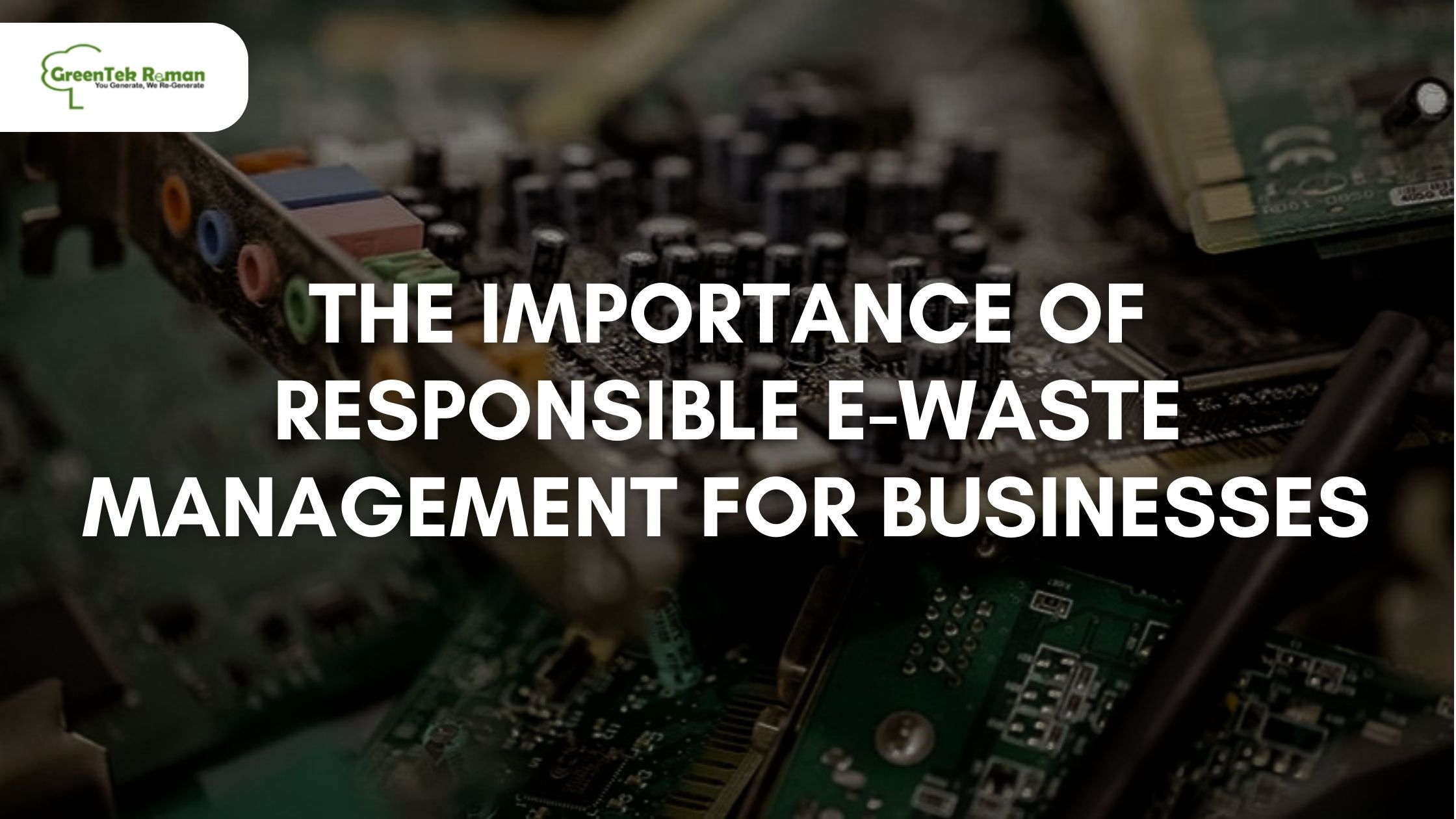The Importance of Responsible E Waste Management for Businesses
E-waste poses a growing environmental challenge, with approximately 63 million tons of electronic waste generated globally in 2021 alone. When disposed of improperly, e-waste can release hazardous chemicals into the atmosphere, exacerbating the problem. Moreover, the irresponsible handling of e-waste strains the future availability of precious metals and results in a significant loss of approximately $10 billion worth of platinum, gold, and palladium, which end up in landfills. However, responsible e-waste management encompasses more than just sustainability concerns. For businesses, embracing responsible e waste management is an ethical imperative and a strategic decision.
Impact of Improper E Waste Disposal
Businesses must consider the serious environmental concerns associated with improper e-waste disposal. The first is that it causes resource depletion, which prompts more mining activities and might disrupt the supply chain. Furthermore, e-waste pollution and contamination can damage ecosystems and impact the quantity and quality of available natural resources. This, in turn, may impact the resilience and sustainability of corporate operations. Businesses may also have legal and regulatory repercussions for breaking e-waste management laws. Businesses may reduce environmental concerns, strengthen their brand reputation, increase cost-effectiveness through e-waste recycling and metal recovery from e waste, and show a commitment to sustainability by using ethical e-waste management practices.
Benefits of Responsible E Waste Management for Businesses
- Minimizing environmental impact and promoting sustainability: Responsible e-waste management is crucial for preserving our planet. Reusing materials from retired electronics helps sustain finite resources and prevents hazardous components from contaminating the environment. Improper disposal can lead to soil, water, and food contamination. Embracing a circular economy model where manufacturers take responsibility for the entire lifecycle of their products, reduce waste, and conserve resources. Collaboration between manufacturers, recyclers, governments, and consumers is vital for widespread implementation. Let’s work together to minimize the environmental impact of e-waste and create a sustainable future.
- Improving brand reputation and public perception: Reliable e-waste management shows a company’s commitment to corporate social responsibility while enhancing brand reputation and public perception. Businesses can improve their brand name and develop trust with clients, shareholders, and other stakeholders by prioritizing properly treating e-waste. The public’s impression of businesses is increasingly influenced by their environmental policies, and ethical e-waste management can help them stand out from rivals and foster a positive reputation.
- Cost savings through recycling and reusing electronic devices: Using efficient e-waste management techniques can help organizations save a lot of money by recycling and reusing electronic items. Electronic device recycling and reuse can lessen the demand for new equipment purchases and lower procurement costs. The cost of raw materials can be decreased by metal recovery from e waste and reusing some parts and materials from recycled e-waste. Businesses can achieve financial savings while reducing waste output by implementing circular economy concepts.
- Enhanced Data Security: Data security has become a paramount concern in recent years, highlighted by alarming statistics. In 2018 alone, Gemalto reported 945 data breaches, resulting in a staggering compromise of 4.5 billion data records. Such breaches lead to significant financial damage, with costs increasing by over six percent in recent years, averaging $3.86 million per breach. However, the costs extend beyond monetary losses and can involve the loss of business opportunities and the erosion of client trust. By implementing proper e-waste management practices, businesses can mitigate the risk of data breaches.
- Encouraging innovation and resource efficiency: Responsible e-waste management can stimulate innovation and resource efficiency within a business. By understanding the lifecycle of electronic devices and the potential for recycling and reusing materials, companies can explore innovative solutions to reduce waste generation and optimize resource utilization. This can lead to more efficient use of resources, cost savings, and potential opportunities for developing new products or services.
Key Strategies for Effective E waste Management:
Recognize the Environmental Impact: Understand the hazardous nature of e-waste and the potential risks it poses to ecosystems and human health. Promote sustainable practices that prioritize proper handling, recycling, and disposal of electronic components.
Foster Industry Collaboration and Extended Producer Responsibility (EPR): Encourage cooperation between governments, manufacturers, retailers, and consumers to establish comprehensive policies and programs. Implement EPR initiatives that hold manufacturers accountable for the entire lifecycle of their products, promoting responsible e-waste management.
Raise Awareness and Educate the Public: Conduct educational campaigns to increase public awareness about the environmental impact of e-waste. Inform individuals and businesses about proper disposal methods, recycling options, and the benefits of recycling. For proper e-waste management, collaborate with community organizations, educational institutions, community organizations, and local governments to organize workshops, e waste recycling drives, and e-waste collection events.
Embrace Technology Innovation and E-Waste Tracking: Harness technological advancements to improve e-waste management. Explore the use of blockchain technology for transparent tracking and tracing of e-waste throughout its lifecycle. Invest in innovative recycling techniques such as automated sorting systems and eco-friendly extraction methods to enhance resource recovery and minimize waste.
Advocate for Global Cooperation and Policy Implementation: Address the global nature of the e-waste challenge through collaborative efforts. Encourage governments to enact and enforce stringent e-waste regulations. Promote international cooperation and knowledge sharing to develop effective e-waste management practices.
How Do We Help?
GreenTek Reman offers comprehensive solutions for businesses seeking responsible disposal and recycling of electronic devices. Our organization is committed to environmental stewardship, data security, and sustainable resource recovery. With our expertise, the latest facilities, and adherence to strict regulatory standards, we ensure that e-waste is handled responsibly and ethically.
Partnering with GreenTek Reman enables businesses to meet their e-waste management obligations and enhance their brand reputation as socially responsible entities. Together, we can protect the environment, preserve valuable resources, and create a sustainable future.


